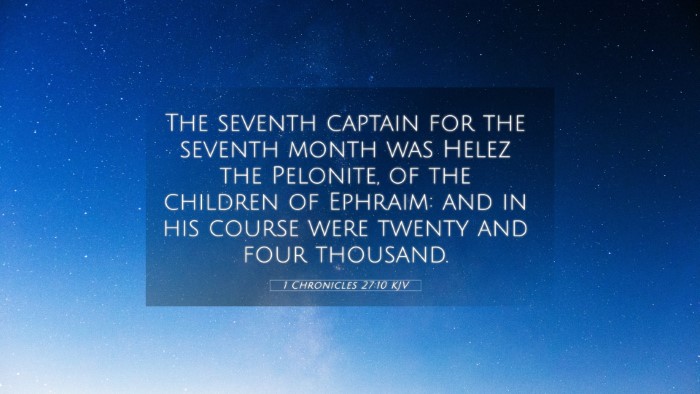Understanding 1 Chronicles 27:10
In this section, we explore the meaning and implications of 1 Chronicles 27:10, providing insights from various public domain commentaries, including those of Matthew Henry, Albert Barnes, and Adam Clarke.
Contextual Overview
The verse in question reads: "The seventh captain for the seventh month was Helez the Pelonite, of the children of Ephraim: and in his course were twenty and four thousand." This passage is part of a broader account in Chronicles that emphasizes the organization and leadership within Israel during King David's reign.
Historical Significance
According to Matthew Henry, the listing of military captains reflects David's thorough approach to governance and defense. This systematic arrangement of warriors indicates the king's intent to establish order and ensure the security of the nation through appointed leaders.
Leadership and Accountability
Albert Barnes emphasizes the importance of leadership as represented by Helez the Pelonite, highlighting that effective governance relies on capable leaders who carry responsibilities for their designated groups. This selection demonstrates a reliance on established tribes, reinforcing tribal connections and responsibilities within the Israelite community.
Divine Order in Military Service
Adam Clarke points out that the particular allocation of military roles based on months suggests a divine order in Israel's military structure. The careful planning into months implies that these leaders were not just randomly appointed but had a designated role in contributing to the nation’s overall strategy.
Thematic Bible Verse Connections
1 Chronicles 27:10 can be connected to various other scriptures that reflect themes of leadership, organization, and divine order. Here are some notable cross-references:
- 1 Samuel 10:19: Highlights the people's rejection of divine leadership.
- 2 Samuel 23:8-39: Lists David's mighty men, placing emphasis on their bravery and dedication.
- 1 Chronicles 12:27: Discusses the tribe of Ephraim's contribution to David’s supporters.
- Exodus 18:21: Details the appointment of capable leaders among the people, reflecting Moses’ leadership model.
- 2 Chronicles 31:2: Illustrates Hezekiah organizing the priests and Levites for temple service.
- Psalm 112:1-2: Describes the blessings of those who fear the Lord and their generational impact.
- Acts 6:3: The apostles appointing trustworthy individuals to oversee the distribution of food serves as an early church precedent of organized leadership.
Connecting Themes across the Old and New Testaments
The orderly military structure in 1 Chronicles reflects foundational principles that are echoed in the New Testament. Leaders are highlighted throughout scriptures as responsible figures who are expected to lead wisely and judiciously, much akin to how the apostles structured the early church.
Tools for Bible Cross-Referencing
Engaging with the Bible’s interconnected themes can deepen understanding. Tools such as Bible concordances and cross-reference guides facilitate tracing themes and connections between verses effectively. Here are suggested methods:
- Bible Concordance: A resource for finding specific verses based on keywords.
- Bible Cross-Reference Guide: Helps identify related verses that share similar themes.
- Cross-Reference Bible Study: Engaging in parallel study of verses to uncover deeper meanings.
- How to Use Bible Cross-References: Exploring methodologies for linking scriptures to form coherent messages.
Conclusion
1 Chronicles 27:10 encompasses a wealth of wisdom regarding leadership and organization in biblical times. By examining this verse alongside cross-referenced themes from both the Old and New Testaments, we can appreciate the extensive layers of meaning within scripture. This understanding leads to a richer engagement with the Bible and encourages individuals to pursue further study of interconnected verses.
Further Study Recommendations
To deeply engage with the themes presented in 1 Chronicles 27:10, consider:
- Exploring links between the Prophets and Apostolic teachings.
- Conducting a comparative study of Pauline epistles to understand leadership roles in church formation.
- Looking into how the themes of military organization in the Old Testament relate to church governance in the New Testament.




